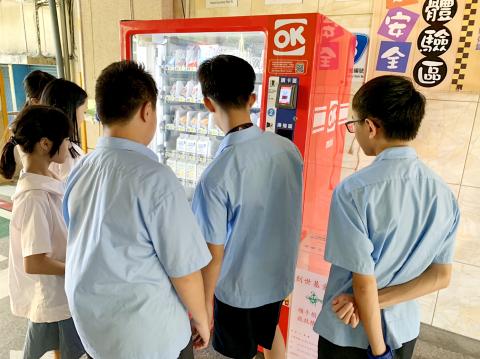Taipei Mayor Ko Wen-je (柯文哲) yesterday said that he would ask the Taipei Department of Information Technology to draft a special regulation to protect personal information, after smart vending machines placed on school campuses in the city sparked privacy concerns.
The machines can only be operated by scanning a student’s ID card and do not accept cash.
“Smart city, big data, or AI [artificial intelligence] smart vending machines, these are imperative,” Ko said.

Photo courtesy of the Taipei Department of Education
“However, as people are concerned about personal information protection, I will ask the Department of Information Technology to draft a special chapter to regulate city government or private companies’ handling of data ownership,” he said.
While the city government references similar laws in the EU or the US, Taiwan also has the Computer-Processed Personal Data Protection Act (電腦保護個人資料處理法), he added.
The Taipei Department of Education in March announced that it had chosen nine schools to test smart vending machines to sell safety-approved food products and stationery on campus.
The policy’s aim is “to let students get used to cashless transactions from a young age,” it said.
The goal is to let every public school in the city have at least one smart vending machine, it said at the time.
The department said in a news release on Sunday that as of Sept. 30, smart vending machines had been installed in 89 schools in the city, but if the schools or parents have concerns over the policy, they can suspend the installations until a consensus has been reached.
“The department will continue to communicate and promote the policy to help schools and parents fully understand it. We hope that the policy, as well as courses on transaction data analysis, financial management and life education, can help students learn more about these concepts,” it said.
The policy also sparked debates about food hygiene and nutritional value, as well as possible overspending by children and personal information safety.
National Chengchi University associate professor of law Liu Hung-en (劉宏恩) on Monday said on Facebook that as student ID cards come with EasyCard payment functions, he suspects the policy’s aim is to collect big data on students’ consumption behavior to develop an “artificial intelligence business model.”
Democratic Progressive Party (DPP) Secretary-General Luo Wen-jia (羅文嘉) also questioned the policy, saying that its main purpose is to help companies make money and that it has no educational value.
DPP Taipei City Councilor Wu Pei-yi (吳沛憶) on Monday said that two companies have been commissioned to install the machines in more than 230 schools in the city.
The companies are to pay a rent of NT$1,000 per machine per month over three years, Wu said.
She asked whether the policy’s real aim is to collect data and why all of the city’s schools have been required to have at least one machine on their campus.
Taipei Department of Education Chief Secretary Chen Su-hui (陳素慧) yesterday said that when students buy products with their student IDs, the machines only scan the card number and do not access students’ personal information.
Ko has repeatedly said he aims to transform Taipei into a smart city, where transactions would be made through digital payments and cash would be eliminated.
He has also said that the city would take the lead by implementing a digital payment policy in government facilities.

Taiwan is stepping up plans to create self-sufficient supply chains for combat drones and increase foreign orders from the US to counter China’s numerical superiority, a defense official said on Saturday. Commenting on condition of anonymity, the official said the nation’s armed forces are in agreement with US Admiral Samuel Paparo’s assessment that Taiwan’s military must be prepared to turn the nation’s waters into a “hellscape” for the Chinese People’s Liberation Army (PLA). Paparo, the commander of the US Indo-Pacific Command, reiterated the concept during a Congressional hearing in Washington on Wednesday. He first coined the term in a security conference last

Prosecutors today declined to say who was questioned regarding alleged forgery on petitions to recall Democratic Progressive Party (DPP) legislators, after Chinese-language media earlier reported that members of the Chinese Nationalist Party (KMT) Youth League were brought in for questioning. The Ministry of Justice Investigation Bureau confirmed that two people had been questioned, but did not disclose any further information about the ongoing investigation. KMT Youth League members Lee Hsiao-liang (李孝亮) and Liu Szu-yin (劉思吟) — who are leading the effort to recall DPP caucus chief executive Rosalia Wu (吳思瑤) and Legislator Wu Pei-yi (吳沛憶) — both posted on Facebook saying: “I

The Ministry of Economic Affairs has fined Taobao NT$1.2 million (US$36,912) for advertisements that exceed its approved business scope, requiring the Chinese e-commerce platform to make corrections in the first half of this year or its license may be revoked. Lawmakers have called for stricter enforcement of Chinese e-commerce platforms and measures to prevent China from laundering its goods through Taiwan in response to US President Donald Trump’s heavy tariffs on China. The Legislative Yuan’s Finance Committee met today to discuss policies to prevent China from dumping goods in Taiwan, inviting government agencies to report. Democratic Progressive Party Legislator Kuo Kuo-wen (郭國文) said

The Ministry of Economic Affairs has fined Taobao NT$1.2 million (US$36,900) for advertisements that exceeded its approved business scope and ordered the Chinese e-commerce platform to make corrections in the first half of this year or its license would be revoked. Lawmakers have called for stricter supervision of Chinese e-commerce platforms and more stringent measures to prevent China from laundering its goods through Taiwan as US President Donald Trump’s administration cracks down on origin laundering. The legislature’s Finance Committee yesterday met to discuss policies to prevent China from dumping goods in Taiwan, inviting government agencies to report on the matter. Democratic Progressive Party